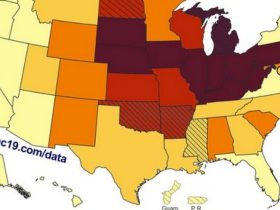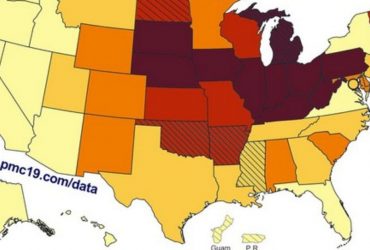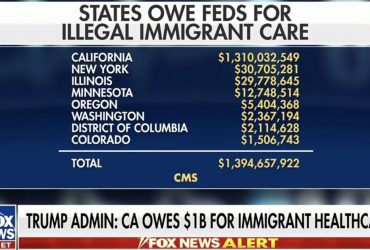Chinese drone. Photo: Courtesy of Aviation Industry Corporation of China
Over the past few years, several sensitive properties near U.S. military bases have been purchased by Chinese entities linked to the Chinese Communist Party. In 2022, the Committee on Foreign Investment in the United States, a government panel that reviews foreign purchases of American land or companies for national security risks, received a tip that a company called MineOne had bought land within a mile of an air base.
The report triggered a national security review. MineOne, which is majority owned by nationals of the People’s Republic of China, purchased 12 acres within one mile of Francis E. Warren Air Force Base in Wyoming and began converting the property into a cryptocurrency-mining facility.
Also in 2022, Chinese billionaire Zhong Shanshan purchased 23 acres of industrial land in Nashua, New Hampshire, for $67 million. The site is close to L3Harris Technologies, near BAE Systems’ electronic systems division, and within 30 minutes of New Boston Space Force Station. The sale bypassed CFIUS review despite its proximity to these defense facilities.
In 2023, Fufeng Group bought 370 acres about 12 miles from Grand Forks Air Force Base. The company’s chairman, Li Xuechun, served as a deputy to the Shandong Province People’s Congress and was honored as a provincial Model Laborer. Grand Forks Air Force Base was being expanded at the time to lead future intelligence, surveillance, and reconnaissance operations. Fufeng leadership has repeatedly emphasized the Party’s role in guiding the company’s development. The project was halted after Pentagon objections.
That same year, Chinese real estate tycoon Sun Guangxin spent tens of millions to buy more than 140,000 acres near Laughlin Air Force Base, where U.S. military pilots train. Sun is a former captain in the People’s Liberation Army with close links to the CCP. His senior advisers are former PLA generals, and he operates dozens of CCP grassroots branches. The land includes a private runway and sits between Laughlin Air Force Base and the U.S.-Mexico border. Sun is the wealthiest businessman in Xinjiang Province and a long-time CCP member.
Some of these problematic purchases are harder to trace back to the Chinese Communist Party because they are carried out through layers of shell companies and intermediary entities, sometimes using U.S. or Canadian residents to further obscure CCP involvement. One example is the network of companies connected to Esther Mei and her husband, Cheng Hu, which corporate and property records show has acquired land beside several sensitive U.S. military installations.
One of these properties, the Knob Noster Trailer Park in Missouri, sits directly outside Whiteman Air Force Base, home of the B-2 Spirit nuclear-capable stealth bomber fleet.
That Missouri property was purchased in August 2017 through a shell company, Property Solutions 3603 LP, and transferred two months later to a Georgia firm controlled by the couple. Shortly afterward, another entity they managed acquired the Pecan Grove Mobile Home Park in Oglethorpe, Georgia, about 35 miles from Robins Air Force Base and roughly 50 miles from Fort Benning.
Depending on how one defines “close to” or “a defense-sensitive location,” these purchases could be written off as coincidental. But the fact that a wealthy couple living in Canada chose remote trailer parks as their investment target is unusual and difficult to explain through ordinary market logic.
Corporate, legal, and media records also connect the couple to organizations and activities that raise serious questions about ties to the Chinese Communist Party. Esther Mei and Cheng Hu are active members of the New Federal State of China, the political movement launched by Miles Guo, who has repeatedly acknowledged past work with Chinese intelligence services.
Under NFSC branding, the couple have appeared in livestream programs and promotional material, and both were named in a British Columbia civil lawsuit filed by journalist Gao Bingchen, who alleges they took part in a campaign of harassment and defamation outside his home. Videos posted by Gao appear to show Mei and Hu participating in NFSC demonstrations in Surrey, where dissidents and human-rights activists were targeted in street protests linked to Guo’s network.
Esther Mei joined the board of Urban Select Capital in 2016. The firm, later renamed Roadman Investments Corp., described itself on its website as “an investment issuer focused on investing growth capital in private and public companies in Canada, China, and the U.S.” Its investments in public companies in China linked the firm to the CCP’s state-directed investment system.
Urban Select operated offices in Hong Kong and Beijing and established an investment company inside Suzhou Industrial Park, a PRC-controlled economic zone that hosts numerous firms sanctioned by the United States for supporting China’s military.
The company also formed partnerships with several Chinese state-owned enterprises, including Suzhou Venture Holdings, now called Oriza Holdings, the government-run venture arm of Suzhou Industrial Park and a central component of China’s military-civil fusion strategy.
Urban Select’s internal roster showed significant CCP presence. Archived versions of its website listed at least four CCP members among its employees, along with a National People’s Congress delegate and a staff member from the Chinese People’s Association for Friendship with Foreign Countries, a united front organization.
Several advisers came from the National Development and Reform Commission, the State Council agency that oversees major economic planning and many military-civil fusion programs. One board adviser, also a CCP member, had held positions in China’s 863 and 973 Programs, initiatives used to acquire foreign technology for national defense through overt and covert means.
At least 22 states have enacted laws restricting foreign land ownership. Nebraska now blocks persons from countries of concern from buying land near military bases, and Utah modified constraints on restricted foreign entities from China, Iran, North Korea, and Russia. The Trump administration announced a ban on Chinese ownership or control of farmland on July 8, 2025, with cabinet members warning about Chinese land purchases near U.S. military sites.
However, little progress has been made in forcing Chinese and CCP-linked entities to divest from the properties they already hold. Liberals and Democrats continue to fight even basic restrictions, claiming it is racist to say that Chinese nationals with links to the People’s Liberation Army and the Chinese Communist Party pose a national security threat.
The post CCP Linked Entities Hold Properties Adjacent to Military Bases Across the US appeared first on The Gateway Pundit.











